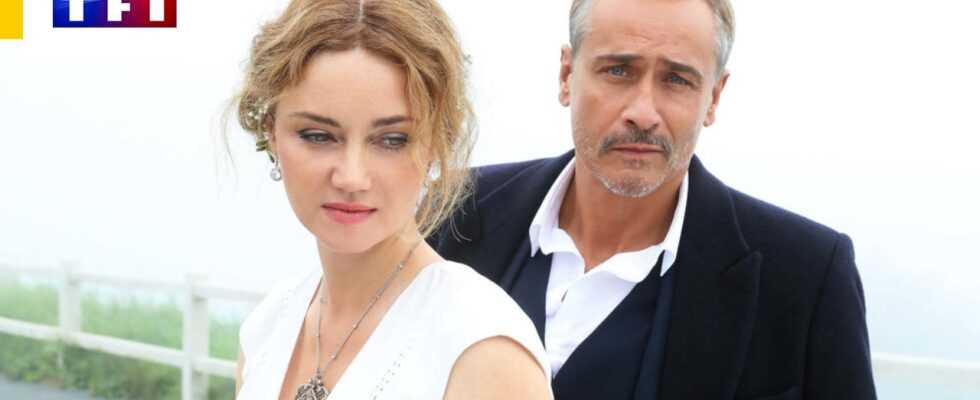After 121 episodes, “Alice Nevers” ended yesterday on TF1. The opportunity to discuss with Marine Delterme and producer Vincent Mouluquet the evolution of the series over its 18 seasons and the moment that changed everything for Alice and the fans.
Last night, Alice Nevers ended on TF1 in front of an average of 5.3 million viewers, who came in large numbers to attend the wedding of Alice and Commander Marquand. A nice score for the latest investigation by Marine Delterme and Jean-Michel Tinivelli, commissioned last year by the channel following the cancellation of the series at the end of its eighteenth season.
On the occasion of the broadcast of this eventful final double episode, Marine Delterme and producer Vincent Mouluquet, whom we met on set last November, came back to us on the evolution of the series which, during its twenty years on the air , will have undergone many changes. And will have participated in writing an important page in the history of French television.
The judge is a woman no more, long live Alice Nevers
The Alice Nevers adventure began in 2002, when Florence Pernel decided to end the series The Judge is a Woman, also known as Florence Larrieu: The Judge is a Woman, of which she has been the heroine since 1993. The production wishes continue the adventure with another actress and Marine Delterme is then chosen to carry on her shoulders the new version of the series, entitled Alice Nevers, the judge is a woman.
A period that today seems very far to Marine Delterme: “I have the impression that we started in the prehistory of series (laughs). When Alice Nevers arrived, I had done ten years of cinema, and at that time I was offered roles that I was less suited to the characters of pretty girls in comedies. So when this role of judge in Alice Nevers comes up, I find it interesting. Especially since I had wanted to be a lawyer before, I had studied law in Assas, and it’s something that I liked, even if I had stopped quite quickly”.
“But obviously, quickly, I’m told ‘No, don’t do that, you’re crazy, don’t go on TV'”continues the one who will have played Alice Nevers for no less than 121 episodes. “It’s changed a lot since then (laughs). But I had grown up with the series, I didn’t denigrate that at all, so I didn’t see why I wouldn’t try to embody this heroine”.
To last 20 years and 18 seasons, the series produced by Pascale Breugnot then Vincent Mouluquet will have had to renew itself, even reinvent itself, several times. Even more perhaps than most other series that can compete with this longevity.
“There have been a lot of changes over these twenty years of Alice Nevers. The format of course, because we went from 90 to 52 minutes, in order to reflect a trend and a need for modernity. But societal changes too “remembers Marine Delterme. “The series was originally called ‘The Judge is a Woman’, and we finally managed to remove this subtitle a few years ago by fighting”.
“To be completely honest, we proposed to change the title a long time ago, but there was resistance”adds Vincent Mouluquet. “And at some point, our interlocutors at TF1 changed, and it became obvious to everyone. The world of justice had changed. When Marine had taken on this role, the question arose, because it there were few female judges. But there was a reversal in terms of balance and after a few years it no longer made sense”.
Christophe Charzat / TF1
How Alice’s pregnancy paved the way for soap opera
Passed to the 52-minute format in 2007, when Jean-Michel Tinivelli arrived in the series in season 6, after the departures of Arnaud Binard and Alexandre Brasseur, Alice Nevers subsequently experienced another major evolution. by finally taking an interest in the personal life of his heroine, which made it possible to go towards the soap opera in the background.
“At the start, on the 90 minutes, it was a time at TF1 where the heroines had to be absolutely perfect, it was a request from the management”deplores Marine Delterme. “No bad faith, never anger, they were fairly smooth heroines, perfect in their profession. And then, over the years, I fought by improvising, finding things. And there was my meeting with Jean-Michel Tinivelli, when we switched to 52 minutes, there was this new breath and we were suddenly more and more free”.
When the star of the series became pregnant, the production then had the idea of integrating her pregnancy into the script. Engaging, without completely being aware of it, which would profoundly modify the DNA of the series and create a new attachment to the public, fond of moments of intimate lives in detective fiction.
“Pascale Breugnot had the idea of making Alice pregnant, when at that time the heroes had no private life, because we had to be able to broadcast the episodes out of order”continues Marine Delterme. “Alice was finally going to have a private life, it was great. And luckily, because I wouldn’t have stayed otherwise. Ten years of investigations without a private life, I couldn’t envisage it. And that’s when- where the series took off even more in terms of audiences”.
“We took advantage of a new contact at TF1 who was Quebecer and had an Anglo-Saxon culture”explains Vincent Mouluquet, who became a producer on Alice Nevers at the time of the transition from 90 to 52 minutes. “And this idea that a heroine could get pregnant was no longer a concern so we rushed into the breach. Given what we were gaining in flesh on the character, it swept the brakes and we became serializing the following season. With as fundamental starting point this pregnancy and the childbirth which was going to close season 8 “.

PHILIPPE WARRIN / TF1
Mathieu, dad by chance
If fans of Alice Nevers obviously know that the father of the heroine’s baby is none other than Mathieu, introduced in the first episode of season 6 in the guise of Alexandre Varga, they may not be aware that this plot was born out of pure chance!
“If we decide to offer the channel to make Alice pregnant, it is also because we had made an episode a year and a half before that TF1 had not yet broadcast. In which Alice found her first love who had disappeared. And she crossed the yellow line to spend the night with him. This is one of those somewhat comical coincidences. So we told TF1 “If you agree to play pregnancy, we have a dad on your shelf, there somewhere” (laughs). It helped build the thing, and Alexandre Varga became the father of Alice’s child without knowing it”reveals Vincent Mouluquet about this essential plot of the series.
“And in this episode, Alice ended up putting Mathieu in prison. So she did it when at the time we didn’t know she would be pregnant. If we had gone to see TF1 and said, ‘Our female judge is going to put the father of her child in prison”, I don’t know how the channel would have reacted (laughs). There, it was obvious and it gave body to the series in a very strong way. That’s what allowed us to build it over time because we were starting with powerful and modern arguments”.
Marine Delterme also says she is very happy with the common thread intrigue that followed on Alice, Mathieu, and Paul. And who, according to her, offered the series one of its most interesting societal questions.
“It led to an essential question of the series: what place to give to this father who is in prison?”confides the actress. “When you separate from the father of your child, if there have been problems, it is very complicated for the mother to consider joint custody when she is afraid of the father for X reasons. Alice does not know who he is. became, he’s a troubled person, she’s afraid to leave her son to him. There was this whole theme about certain seasons that was really dealt with. You make a child with someone and when you have to leave this child to another, it’s not always easy”.
A complicated story between Alice and her ex who also ended up finding a happy conclusion in “Cavalcades”, the final broadcast last night on the front page. But again, it was not won. “On the end, the resolution at the wedding was first written in the mode of confrontation with Mathieu”, explains the interpreter of the prosecutor Nevers. “And I said ‘No no, when Alexandre Varga comes back, he has to say ‘Now we are a family, we will manage to get along and build something positive'”.
According to the producer of the series, it was really the explosion of private life sequences that made viewers have “an even stronger attachment to Alice’s fate”. And the broadcasts at the time on several channels of the TF1 group also allowed the series to reach an even wider audience. “It created a generational renewal of the public. We managed to bring the family together in front of the TV, and I think that’s why we lasted so long”.
“All our subjects were anchored in reality, in questions related to school, to work. And moreover with a human look and a family base, certainly recomposed, but which can resemble the daily life of the French. We touched the entire families”. Families who will be passionate about the life and investigations of Alice Nevers, this judge, then assistant prosecutor, like no other. And who certainly shed a little tear yesterday when they saw Alice and Fred finally say “yes” to each other, after years of love, but also of pitfalls.
